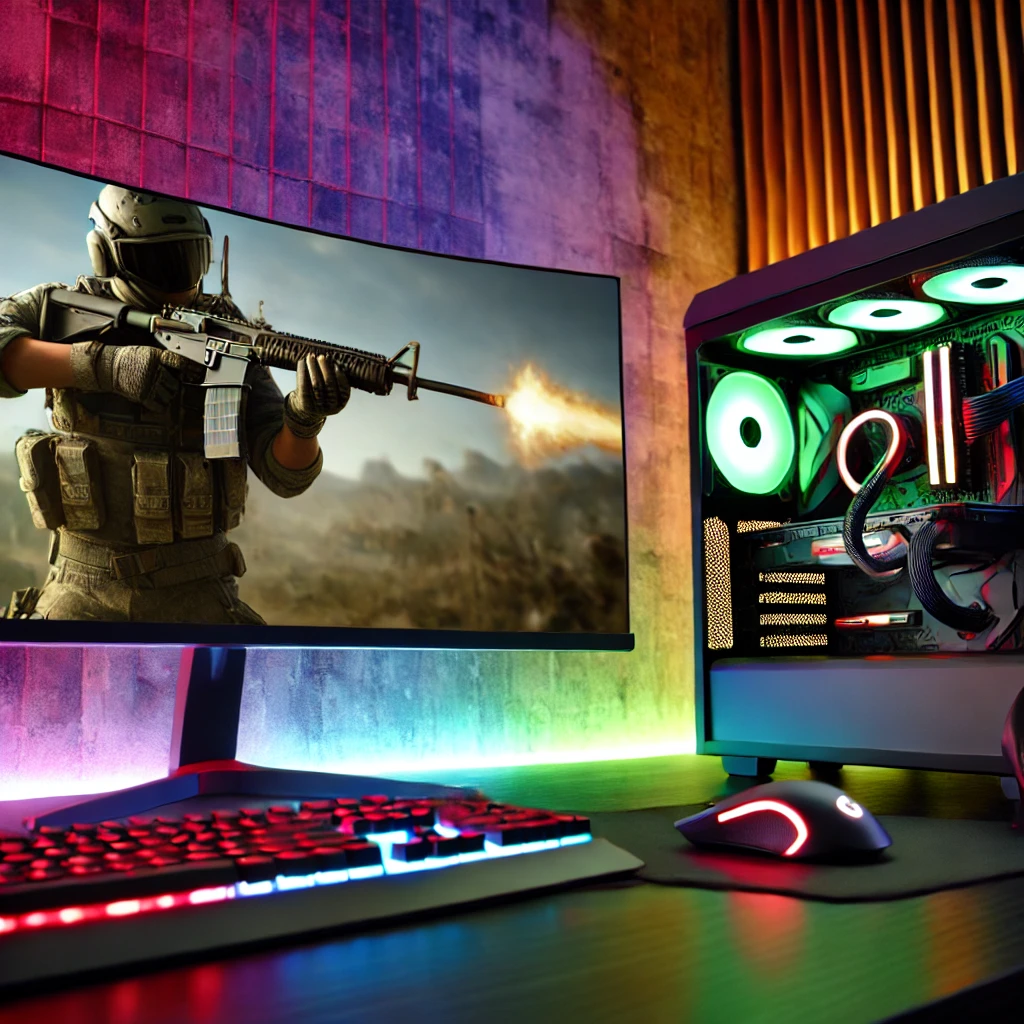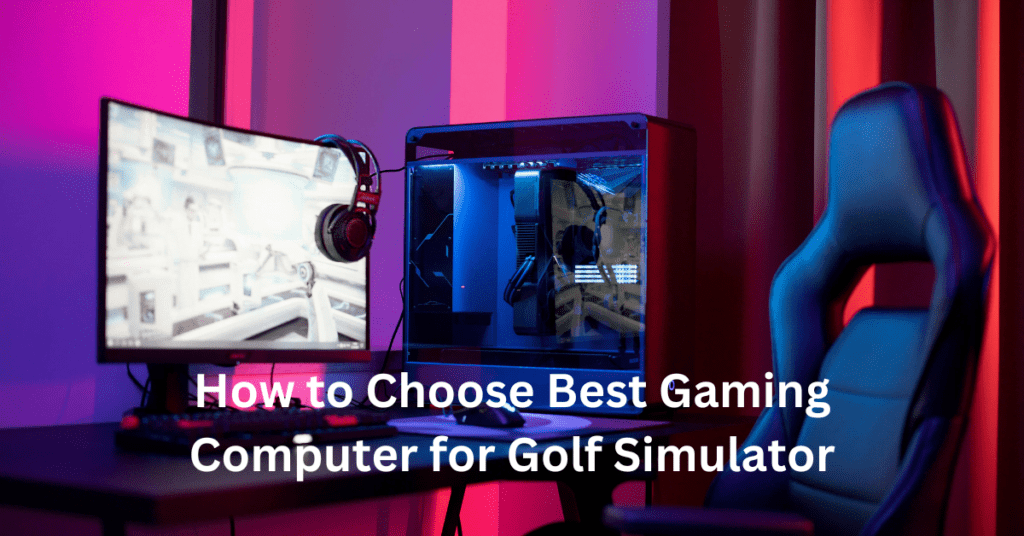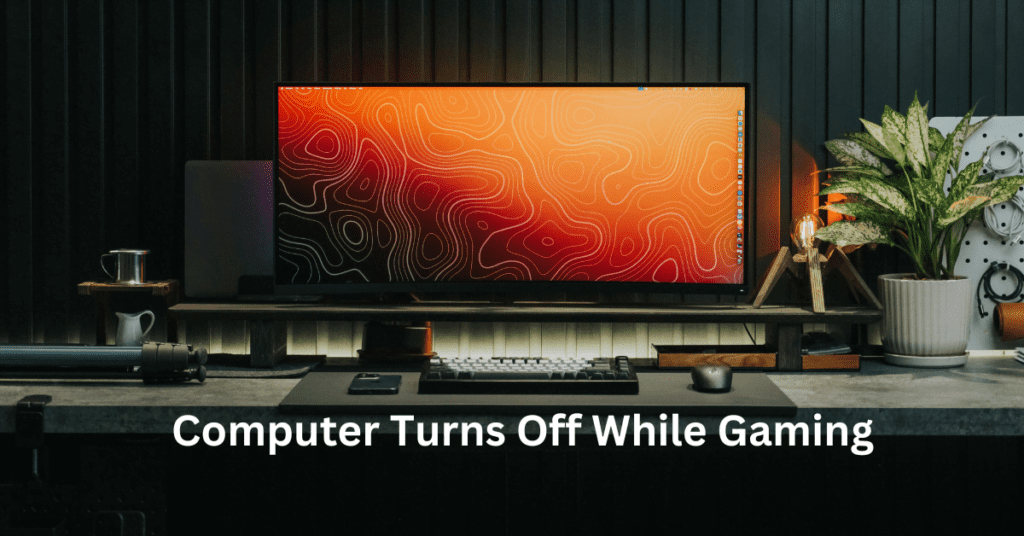First-person shooter (FPS) games demand precision, speed, and split-second decision-making, making them some of the most thrilling yet challenging genres in gaming. Whether you’re tracking enemies in Call of Duty or battling for the win in Valorant, the performance of your gaming PC can mean the difference between victory and defeat. A powerful gaming PC tailored for FPS games is essential for smooth gameplay, low latency, and immersive graphics that keep you in the zone. The Best Gaming PCs for First Person Shooters
Unlike other genres, FPS games require hardware that can keep up with fast reactions and precise movements. High frame rates, quick load times, and minimal input lag are non-negotiables for players looking to stay competitive. This is where a high-performance gaming PC, designed specifically for FPS gaming, becomes your ultimate ally.
In this guide, we’ll dive into everything you need to know about the best gaming PCs for first-person shooters. From pre-built rigs to custom setups, we’ll explore options for every budget, along with tips to optimize performance for smoother, sharper gameplay. Whether you’re a casual gamer or an aspiring esports pro, this article will help you choose the perfect PC for dominating your favorite FPS titles.

What Makes a Gaming PC Ideal for First-Person Shooters?
When it comes to first-person shooters (FPS), having the right gaming PC can make the difference between victory and defeat. FPS games demand quick reflexes, precise aim, and a smooth gaming experience, which is why hardware optimized for FPS gaming is essential.
A. Importance of FPS-Optimized Hardware
High frame rates and low input latency are critical for FPS games. A gaming PC capable of delivering a stable 144 frames per second (FPS) or higher ensures smoother gameplay, allowing you to react faster and aim more accurately. Low input latency minimizes the delay between your actions and the on-screen response, giving you a competitive edge in fast-paced shooters like Call of Duty or Valorant.
B. Core PC Specifications for FPS Gaming
1. GPU (Graphics Processing Unit): The GPU is the heart of any gaming PC, especially for FPS titles. A powerful GPU like the NVIDIA RTX 3060 or AMD RX 6700 ensures high frame rates and detailed visuals, even at higher resolutions.
2. CPU (Processor): A fast processor like the Intel Core i7 or AMD Ryzen 7 ensures smooth performance and handles multitasking, such as gaming and streaming simultaneously.
3. RAM: FPS games typically require at least 16GB of RAM for optimal performance, ensuring smooth transitions and preventing lag.
4. Storage: An SSD drastically reduces load times, letting you jump into matches faster compared to an HDD.
C. Peripheral Considerations
For FPS gaming, high-refresh-rate monitors (144Hz or 240Hz) are a must, as they provide smoother visuals and reduce motion blur. Pair this with low-latency gaming keyboards and mice designed for precise, rapid inputs to further enhance your performance.
An FPS-optimized gaming PC ensures not just better gameplay but also the ability to compete at a higher level, giving you an edge in every match.
Best Pre-Built Gaming PCs for FPS Gaming
Choosing the right pre-built gaming PC for FPS games depends on your budget and gaming goals. Whether you’re an entry-level player or a professional competitor, there’s an ideal option for you. Below, we’ve categorized the best gaming desktops for FPS players into entry-level, mid-range, and high-end tiers, with recommendations based on performance, price, and design.
Entry-Level: Affordable PCs for 1080p Gaming
Recommended PC: HP Pavilion Gaming Desktop
Specs: AMD Ryzen 5 5600G, NVIDIA GTX 1650, 8GB RAM, 256GB SSD
Price: ~$650
Performance: Handles FPS games like Valorant and CS:GO at 1080p, achieving 60-90 FPS on medium settings.
Why Choose? Perfect for beginners who want smooth gameplay without overspending.
Mid-Range: Balanced Price and Performance for 1440p Gaming
Recommended PC: Alienware Aurora R15
Specs: Intel Core i7-13700KF, NVIDIA RTX 3060, 16GB RAM, 512GB SSD
Price: ~$1,500
Performance: Plays Call of Duty: Warzone and Battlefield 2042 at 1440p with 100+ FPS on high settings.
Why Choose? Great for gamers looking for higher resolutions and reliable frame rates.
High-End: Premium Rigs for 4K Gaming and Competitive FPS
Recommended PC: Corsair Vengeance a7200
Specs: AMD Ryzen 9 7900X, NVIDIA RTX 4080, 32GB RAM, 1TB SSD
Price: ~$3,000
Performance: Excels in FPS titles like Apex Legends and Overwatch 2, achieving 120+ FPS at 4K ultra settings.
Why Choose? Designed for professionals seeking the ultimate gaming experience.
Each tier offers pre-built PCs optimized for FPS gaming, ensuring smooth performance, low input lag, and excellent visuals. These options are ready to deliver immersive gameplay across your favorite FPS titles.
Building a Custom Gaming PC for FPS Games
A. Why Build a Custom PC?
Building a custom gaming PC is an excellent choice for FPS enthusiasts who value cost-effectiveness and upgradability. By selecting individual components, you can optimize performance for first-person shooter games without overpaying for unnecessary features. Custom PCs also offer the flexibility to upgrade parts like the GPU or RAM as hardware requirements evolve, ensuring your setup remains competitive for years.
B. Recommended Components for FPS Gaming
To build the best custom gaming PC for FPS games, prioritize these components:
Graphics Card (GPU): The GPU is the backbone of FPS performance. For 1080p gaming, consider the NVIDIA GeForce RTX 3060 or AMD Radeon RX 6600. For 1440p or 4K gaming, step up to the NVIDIA RTX 3070 or AMD Radeon RX 6800 XT.
Processor (CPU): FPS games benefit from high CPU performance. Choose Intel Core i5/i7 or AMD Ryzen 5/7 for a balance of power and affordability.
RAM: 16GB of RAM is sufficient for most FPS games, but upgrading to 32GB ensures smooth multitasking and future-proofing.
Storage: An SSD significantly reduces load times. The Samsung 970 EVO Plus or Crucial MX500 are reliable choices for fast and responsive gameplay.
C. Build Suggestions for Different Budgets
Here are tailored builds for various budgets:
Entry-Level Build: AMD Ryzen 5 5600G (with integrated graphics), 16GB DDR4 RAM, 500GB SSD – Ideal for budget FPS gaming at 1080p.
Mid-Range Build: Intel Core i5-12400F, NVIDIA RTX 3060, 16GB DDR4 RAM, 1TB SSD – Perfect for 1440p gaming.
High-End Build: AMD Ryzen 7 7800X3D, NVIDIA RTX 4080, 32GB DDR5 RAM, 2TB NVMe SSD – Designed for ultra-smooth 4K gaming.
Building a custom PC allows FPS gamers to achieve unparalleled performance tailored to their needs, making it a rewarding investment.
Tips for Optimizing FPS Performance on Any Gaming PC
If you want to get the most out of your gaming PC for first-person shooters (FPS), optimizing performance is key. These tips will ensure smoother gameplay, higher frame rates, and a competitive edge.
1. Adjust Graphics Settings
Fine-tuning graphics settings can significantly improve performance. Lowering resource-heavy options like shadows, anti-aliasing, and ambient occlusion can boost FPS without sacrificing too much visual quality. Turn off unnecessary effects like motion blur and depth of field to reduce distractions in fast-paced FPS games.
2. Basics of Overclocking
Overclocking your GPU and CPU can squeeze out extra performance from your hardware. Use tools like MSI Afterburner for GPUs or Intel Extreme Tuning Utility for CPUs. However, ensure proper cooling and stability testing to avoid hardware damage. Overclocking can be especially useful in maximizing FPS for competitive gaming.
3. Keep Drivers Updated
Regularly update your GPU drivers to benefit from performance optimizations for the latest FPS titles. Tools like NVIDIA GeForce Experience or AMD Adrenalin make it easy to install updates and customize settings for specific games.
4. Manage Cooling Effectively
Intense gaming sessions can lead to thermal throttling, which reduces performance. Ensure your gaming PC has sufficient airflow and consider using aftermarket cooling solutions for your CPU and GPU. Clean dust from fans and vents regularly to maintain optimal cooling.
5. Invest in a Reliable Power Supply
A high-quality power supply unit (PSU) ensures stable power delivery to your components, which is crucial for maintaining consistent FPS. Low-quality PSUs can cause sudden shutdowns or inconsistent performance during demanding gaming sessions
By following these steps, you can enjoy smoother, more immersive FPS gameplay, regardless of whether you have a budget gaming PC or a high-end rig.

Future-Proofing Your Gaming PC
Why Future-Proofing Matters for FPS Enthusiasts
First-person shooters (FPS) are among the most hardware-demanding games, with frequent releases pushing the limits of gaming PCs. Future-proofing your gaming PC ensures it remains capable of delivering high performance as new FPS titles evolve with advanced graphics, physics, and gameplay mechanics. Competitive players especially benefit from consistent frame rates and minimal lag over time, keeping them at the top of their game without the need for constant upgrades.
Investing in Components for Longevity
When building or buying a gaming PC for FPS games, prioritize components that will remain relevant for years to come. For instance, a GPU with DirectX 12 Ultimate compatibility ensures support for cutting-edge rendering technologies like ray tracing and variable-rate shading. Opt for a graphics card with at least 12GB of VRAM capacity to handle future 4K textures and high frame rates at 1440p or 4K resolutions.
A fast CPU, such as an Intel Core i7 or AMD Ryzen 7, paired with sufficient RAM (16GB or more), can handle not just today’s games but also the increasing demands of future titles. Additionally, invest in an NVMe SSD for faster load times and a better overall gaming experience.
The Benefits of Modular Setups and Upgradability
A modular gaming PC allows you to upgrade individual components without replacing the entire system. For FPS gamers, this means you can swap out a GPU for a more powerful model or add extra RAM as games demand more resources. A spacious PC case with efficient cooling solutions makes upgrades easier while ensuring longevity.
Future-proofing your gaming PC not only saves you money in the long run but also guarantees you’ll enjoy the latest FPS games with smooth, immersive gameplay for years to come.
Common Mistakes to Avoid When Buying a Gaming PC for FPS
When shopping for a gaming PC for first-person shooters (FPS), it’s easy to get caught up in the excitement of flashy features or overlook critical factors that impact performance. Here are some common mistakes to avoid:
1. Overprioritizing Aesthetics Over Performance
While RGB lighting and sleek designs can make a gaming PC visually stunning, they don’t contribute to FPS performance. A high-performance gaming PC for FPS games needs powerful components like a reliable GPU and CPU rather than a fancy case. Focus on specs that deliver smooth gameplay, such as high frame rates and low latency.
2. Spending Too Much on Peripherals
It’s tempting to splurge on premium peripherals like gaming keyboards, mice, and headsets. While these accessories enhance your experience, allocating most of your budget to the PC’s core components—GPU, CPU, RAM, and storage—is essential. A low-latency mouse or mechanical keyboard won’t compensate for poor FPS performance caused by an underpowered PC.
3. Ignoring Monitor and Refresh Rate Compatibility
An often-overlooked factor is ensuring your gaming PC matches your monitor’s resolution and refresh rate. A 144Hz or 240Hz monitor demands a PC with sufficient processing power to deliver high frame rates. Investing in a high-refresh-rate monitor is futile if your PC struggles to keep up.
4. Focusing Solely on GPU Without Considering CPU Bottlenecks
A top-tier GPU like the NVIDIA GeForce RTX 4080 won’t perform optimally if paired with a low-end CPU. CPU bottlenecks can severely limit performance in CPU-intensive FPS games. Ensure your CPU and GPU are well-balanced to avoid wasting potential.
By avoiding these common pitfalls, you can ensure your gaming rig is optimized for competitive FPS performance, delivering the edge you need in fast-paced games like Call of Duty and Valorant.
Recommended Accessories for FPS Gaming
When it comes to excelling in first-person shooter (FPS) games, having the right accessories can significantly impact your performance. Let’s explore the must-have peripherals that enhance accuracy, responsiveness, and immersion for FPS players.
Monitors: High-Refresh-Rate Options for 1080p, 1440p, and 4K Gaming
A high-refresh-rate monitor is a critical component for FPS gaming. It ensures smoother visuals and reduces motion blur, giving you a competitive edge. For 1080p gaming, monitors like the ASUS TUF Gaming VG279QM (280Hz) offer ultra-smooth performance at an affordable price. If you prefer 1440p gaming, the LG UltraGear 27GP850-B (165Hz) strikes a balance between resolution and speed. For 4K enthusiasts, the Acer Predator XB273K (144Hz) is an excellent choice, delivering stunning visuals without compromising refresh rates.
Keyboards and Mice: Mechanical Precision and Low-Latency Controls
Mechanical keyboards are a favorite among FPS gamers for their tactile feedback and durability. The SteelSeries Apex Pro with customizable actuation points ensures precise keypresses tailored to your playstyle. Pair it with a low-latency gaming mouse like the Logitech G Pro X Superlight, known for its lightweight design and accuracy. These peripherals are essential for quick reactions and pinpoint targeting in fast-paced FPS games.
Audio Solutions: Gaming Headsets for Spatial Awareness
In FPS games, sound can make the difference between winning and losing. A quality headset like the HyperX Cloud Alpha provides crystal-clear audio and excellent spatial sound, helping you pinpoint enemy movements. For premium features, the SteelSeries Arctis Pro Wireless offers high-fidelity sound and noise-canceling capabilities, perfect for immersive gameplay.
By investing in these top-tier accessories, you’ll maximize your FPS gaming experience and gain the tools to outperform your competition.
How to Choose the Right Gaming PC for You
Choosing the best gaming PC for first-person shooters depends on your gaming style, the titles you play, and your budget. By carefully evaluating these factors, you can find a gaming PC that meets your needs without overspending.
Evaluate Your Gaming Goals
Start by identifying your gaming goals. Are you a casual gamer who enjoys first-person shooters like Valorant or Overwatch during downtime? Or are you a competitive player seeking an edge in intense matches of Call of Duty: Warzone? Professional gamers, on the other hand, require high-end gaming PCs that deliver flawless performance in tournaments. Your goals will dictate the performance level and specifications you should prioritize.
Consider the Games You Play
Different FPS games have varying hardware demands. Popular titles like CS:GO are optimized to run smoothly on mid-range gaming PCs, while newer games like Battlefield 2042 require powerful GPUs and CPUs for seamless 4K gameplay. Research the recommended and optimal specs for your favorite FPS games to ensure your gaming PC can handle them at high settings and refresh rates.
Budget Allocation Tips
Balancing your budget is crucial. For casual gamers, an entry-level gaming PC under $1,000 can provide reliable performance at 1080p resolution. Competitive gamers should aim for mid-range setups between $1,200 and $1,500, offering higher frame rates and better multitasking capabilities. Professional gamers might invest $2,000 or more in high-performance rigs designed for 1440p or 4K gaming.
Remember to allocate some of your budget for essential peripherals like a high-refresh-rate monitor, mechanical keyboard, and low-latency mouse, as they are key to enhancing your FPS experience. With thoughtful planning, you can select the perfect gaming PC tailored to your first-person shooter needs.

Conclusion
A well-optimized gaming PC is essential for first-person shooter enthusiasts who demand precision, speed, and immersion in every match. Whether you’re navigating the intense battlefields of Call of Duty or mastering your aim in Valorant, the right hardware can significantly impact your performance. High frame rates, low input latency, and powerful GPUs ensure smooth and responsive gameplay, while features like SSDs and sufficient RAM enhance overall efficiency and load times.
Choosing the best gaming PC for FPS games depends on your specific needs and budget. If you’re a casual player, a budget gaming PC with solid 1080p performance might be perfect. Competitive gamers aiming for peak performance should invest in a high-end rig designed for 144Hz or even 240Hz monitors. For those who value flexibility, building a custom gaming PC offers endless possibilities to optimize your setup for FPS titles.
Ultimately, the key is to prioritize components that deliver the best bang for your buck without compromising on crucial gaming features. Whether you opt for a pre-built system or build your own, the right gaming PC will elevate your FPS gaming experience to the next level. Explore your options and make the leap to a high-performance rig today!
FAQs for The Best Gaming PCs for First-Person Shooters
1. What specifications should I look for in a gaming PC for FPS games?
Look for a powerful GPU (e.g., NVIDIA GeForce RTX 3060 or higher), a fast CPU (e.g., Intel Core i5/i7 or AMD Ryzen 5/7), at least 16GB of RAM, and an SSD for faster load times. A high-refresh-rate monitor (144Hz or more) is also essential for smoother gameplay.
2. Are pre-built gaming PCs good for FPS games, or should I build one?
Pre-built PCs are great if you want convenience and support, while custom-built PCs offer better customization and potential cost savings. Both options can deliver excellent FPS performance, depending on the components.
3. How much should I spend on a gaming PC for competitive FPS gaming?
For competitive FPS gaming, expect to spend around $1,000 to $1,500 for a mid-range PC and $2,000 or more for a high-end setup capable of 1440p or 4K gaming at high refresh rates.
4. Can a budget gaming PC handle FPS games like Call of Duty or Valorant?
Yes, many budget gaming PCs can handle FPS games at 1080p resolution with medium to high settings. Look for options with an AMD Ryzen or Intel i3/i5 CPU and a mid-range GPU like the NVIDIA GTX 1660 or AMD Radeon RX 6500 XT.
5. What peripherals are essential for FPS gaming?
Invest in a high-refresh-rate monitor (144Hz or higher), a mechanical keyboard for precise inputs, a low-latency gaming mouse, and a good headset for immersive sound and communication during matches.




